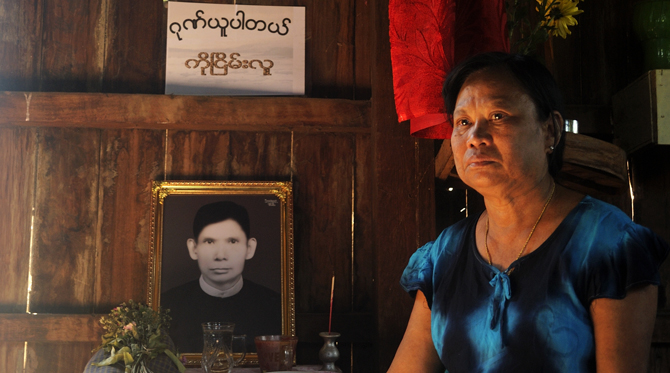Dying Behind Bars

RANGOON — He was gravely ill, wobbling on swollen feet as he passed through the gate of Rangoon's notorious Insein Prison with the help of three people. He hardly recognized his sister—the only living member of his immediate family—but his face was lit up with a smile when, on Jan. 13, Burma's nominally civilian government released him after 10 years behind bars as part of its latest amnesty for political prisoners.
Nine days later, however, Ko Thet Nwe was dead.
“My brother was very fit, both physically and mentally, when he was arrested. His health was frail because he was tortured in prison. He was also denied proper medical treatment. By the time he was released, it was too late to save him,” said his sister, Daw Marlar Nwe, 56, explaining the sudden death of Thet Nwe, who was also known as Nyein Lu.
“I make a sincere plea to the government of U Thein Sein: Please end the kind of torture that the Military Intelligence Service inflicted on my brother in interrogation centers and prisons,” she added tearfully, speaking from her home in Shwe Pyi Tha, a few hours drive from downtown Rangoon.
In a 2009 report, the Thailand-based Association for Assistance of Political Prisoners (AAPP) said that at least 139 political prisoners have died in detention since 1998 as a direct result of severe torture, denial of medical treatment and inadequate medical care.
Despite recent improvements in political prisoners' rights, Thet Nwe's death and a series of interviews with recently released political dissidents have revealed the harsh conditions that inmates continue to endure, including mistreatment in interrogation centers and inadequate health care.
Thet Nwe was an underground activist for the Burmese pro-democracy movement, spending most of his time in Thai-Burmese border towns, where he supposedly received some military training, according to a colleague.
In the 1990s, the high-school dropout disappeared from home, leaving his family wondering if he was alive or dead. It was not until November 2002 that he surprised his sister by suddenly appearing for a short visit.
One of his close friends said the native of Rangoon's Insein Township had returned to recruit young activists for political training outside the country. “Shortly before his return to the border, a police informer in Shwe Pyi Tha tipped off the Military Intelligence Service,” the friend said.
Thet Nwe was arrested in December during a midnight raid on his sister's home and charged with unlawful association with armed groups outside the country. His sister was also detained for letting him stay at her residence.
Both were taken to the Military Intelligence Unit 26 (known as MI 26) interrogation center, a waterfront cantonment in northern Rangoon, a few minutes drive from Kaba Aye Pagoda.
“They handcuffed my baby brother behind his back and put very roughly made wooden shackles on him in my presence. They also pushed his face into human excrement to force him to talk,” recalled Marlar Nwe as people bustled around her two-story home preparing food offerings for monks who would come the next day to mark the end of the seven-day mourning period for her brother.
She shed a tear as she recounted how all of her brother's teeth were extracted during the interrogation sessions. “They used every possible means of torture. They gave him electric shocks when they were not pleased with his answers. My brother was very….” She choked up.
Arkar Boh of Generation Wave has vivid memories of how he was mistreated while under interrogation following his arrest in 2008. “They slapped me in the face. They forced me to kneel on an uneven surface littered with small pebbles for a long time and kicked me from behind,” said the 29-year-old political activist.
In Burma, severe physical and mental abuses during interrogations were primarily committed by the former Military Intelligence Service under the control of the Directorate of Defense Services Intelligence. Interrogations were conducted by the Bureau of Special Investigations and the Burmese Police Force's Special Information Force, better known as the “Special Branch,” according to AAPP.
Thet Nwe was given a 38-year sentence for his alleged crimes. His sister was given 25 years for aiding and abetting, but was released unconditionally in 2005.
Over his ten year captivity, Thet Nwe developed tuberculosis, nervous system ailments, mental disorders and the liver cancer that took his life.
1 | 2 | 3 next page »
|
||
|
||
|
||
|
||
|
||
|
||
|
||
|
||
|
||
|
||
- Students Without a University
- Displaced and Distressed
- Training the Next Generation of Kachin Rebels
- Rangoon Art Show Provides Arresting Display
- Magical Mandalay Still Holds Court for Tourists
- Distrust and Displacement on Kachin Frontline
- Thein Sein: Reformist or Caretaker?
- School’s Not Out in Kachin State
- Irrawaddy Dolphins are Firm Fisherman’s Friends
- Thein Sein: Reformist or Caretaker?
